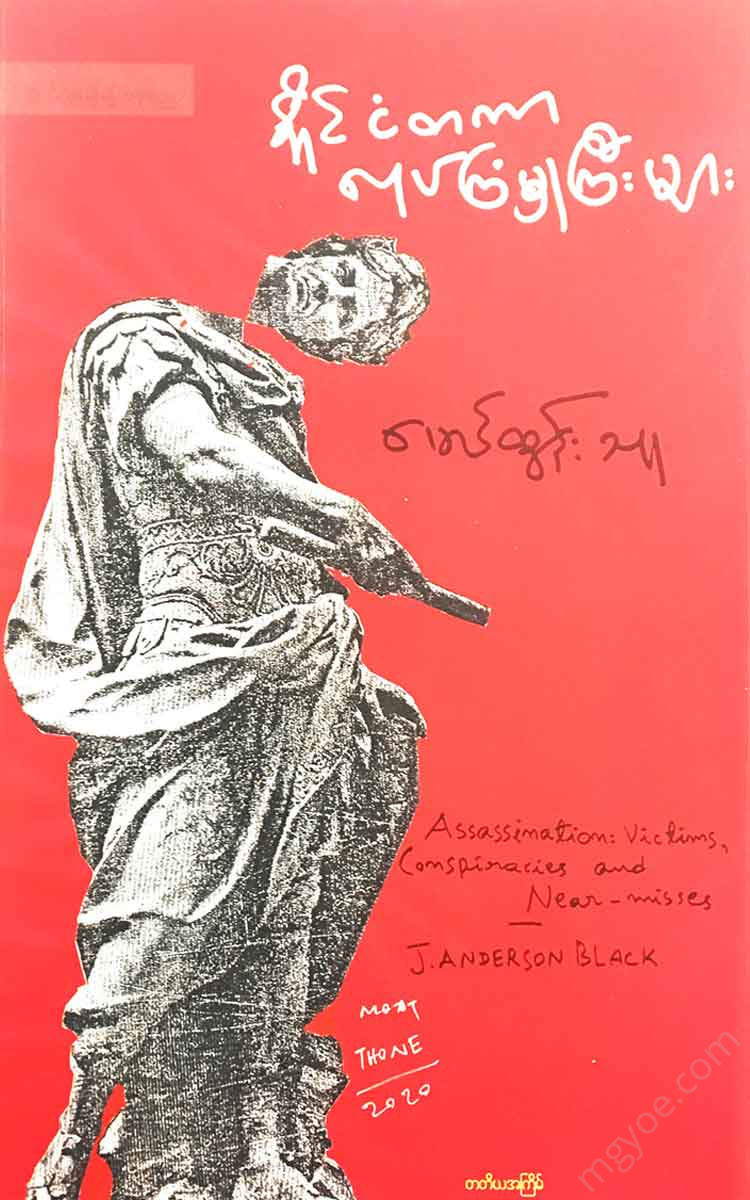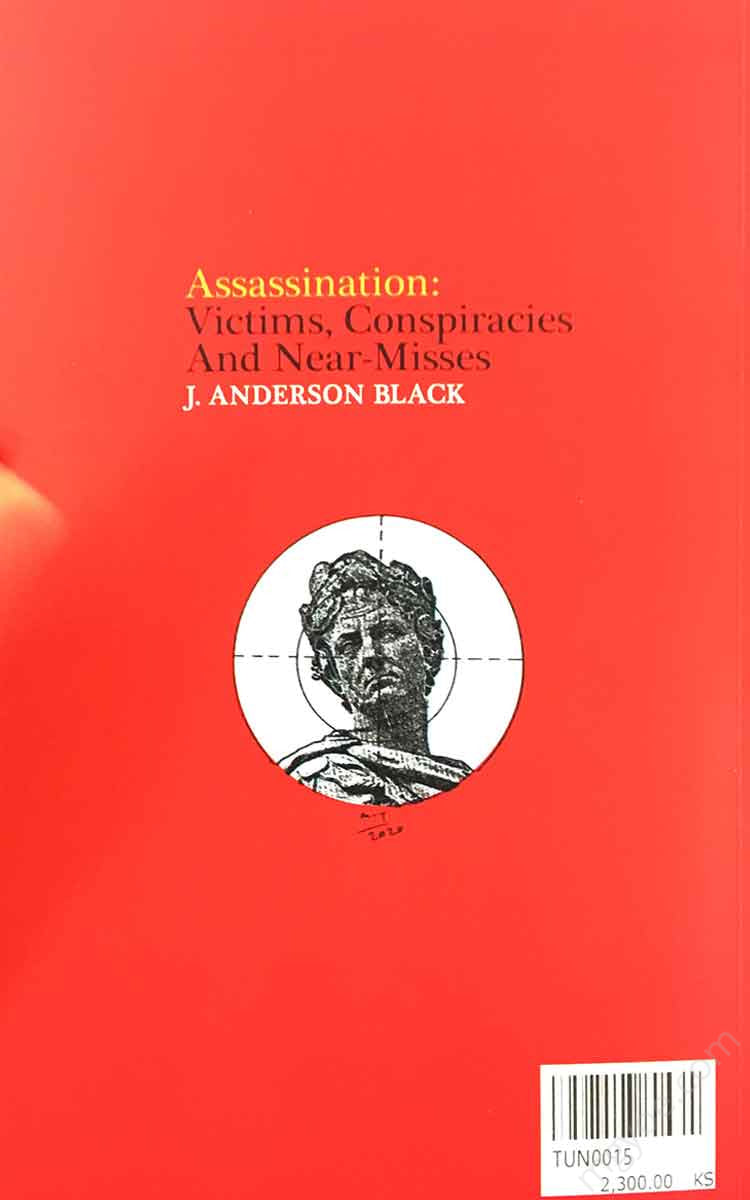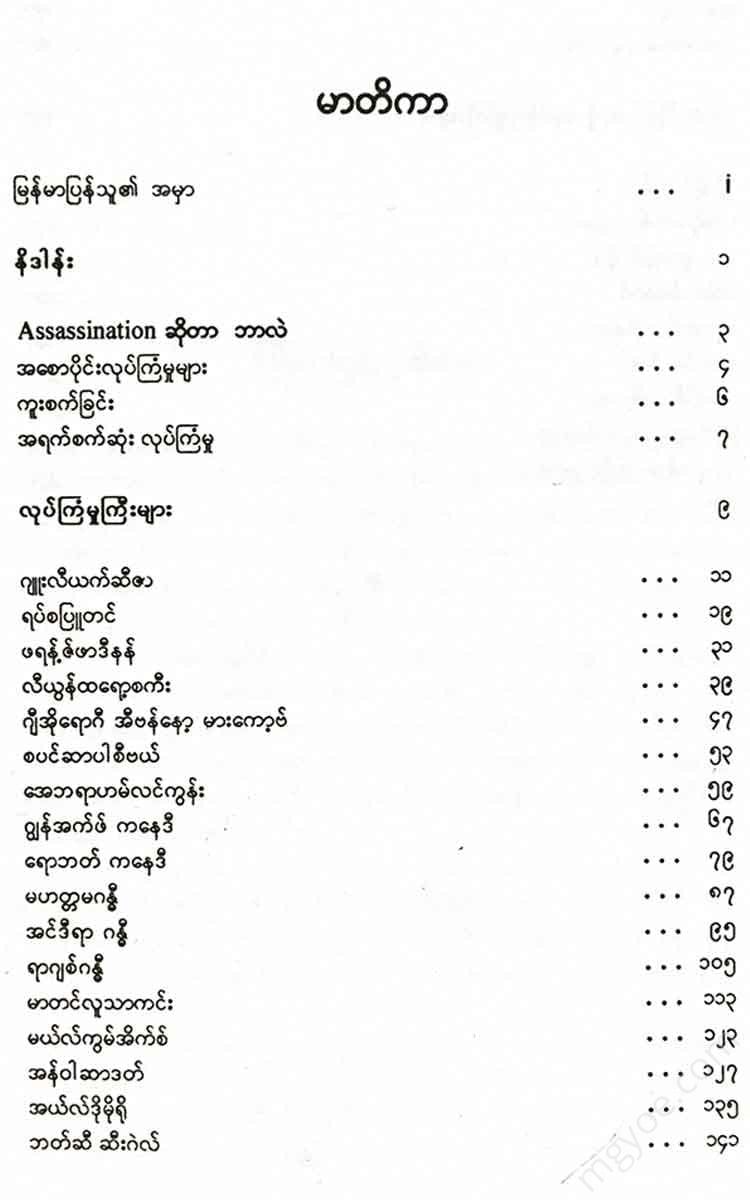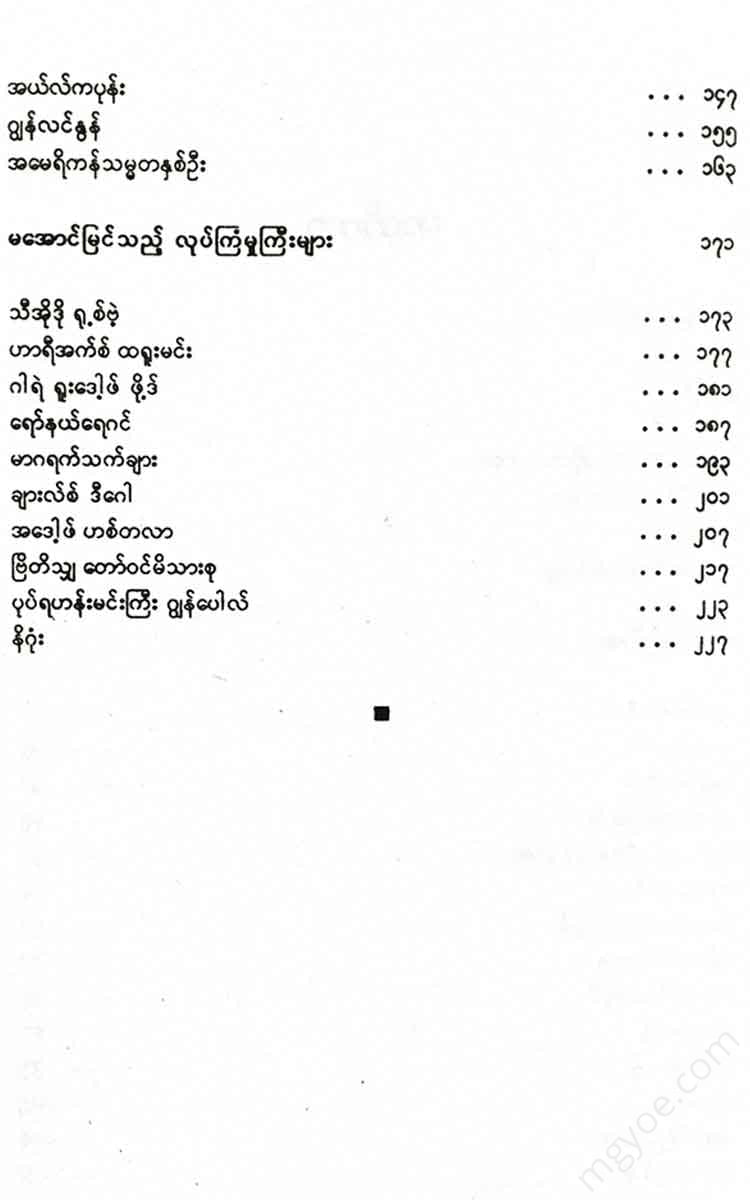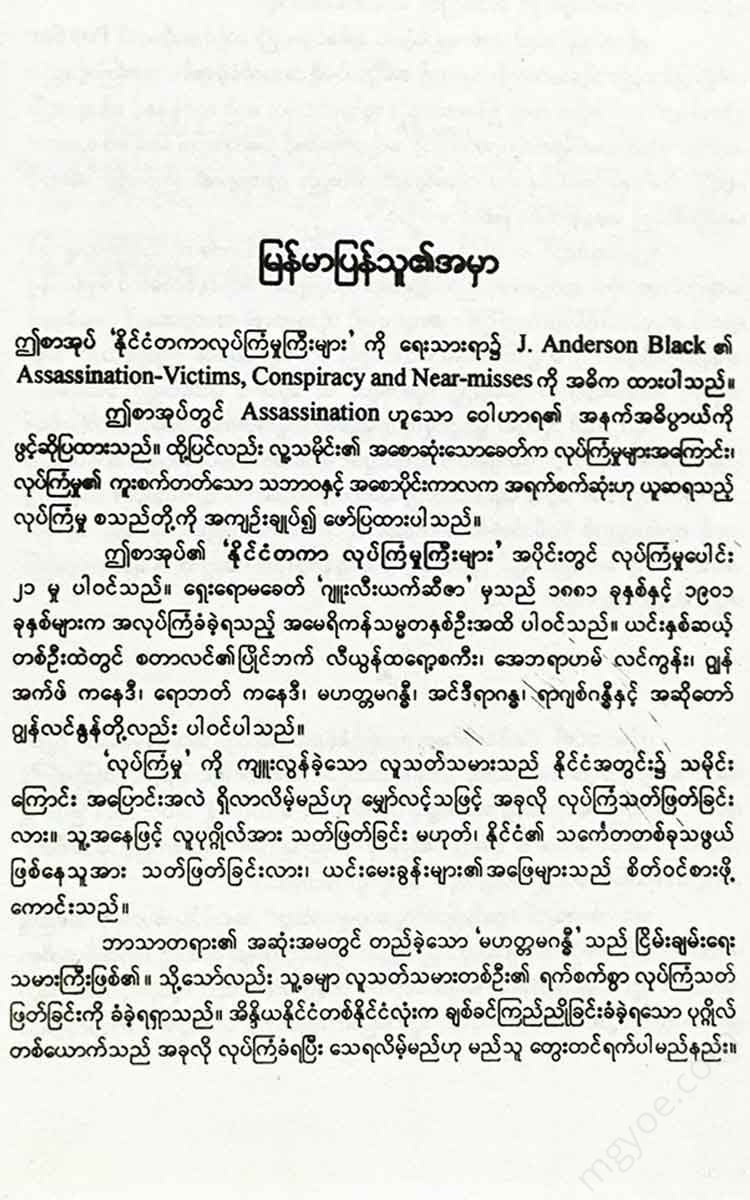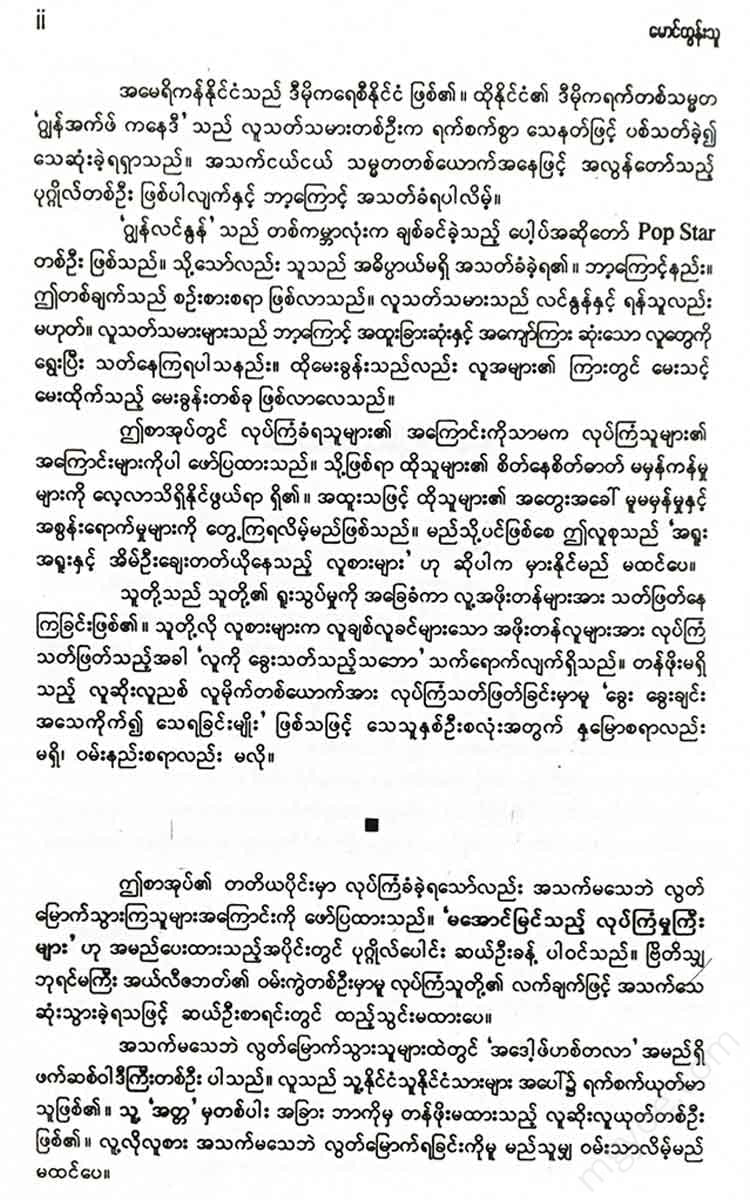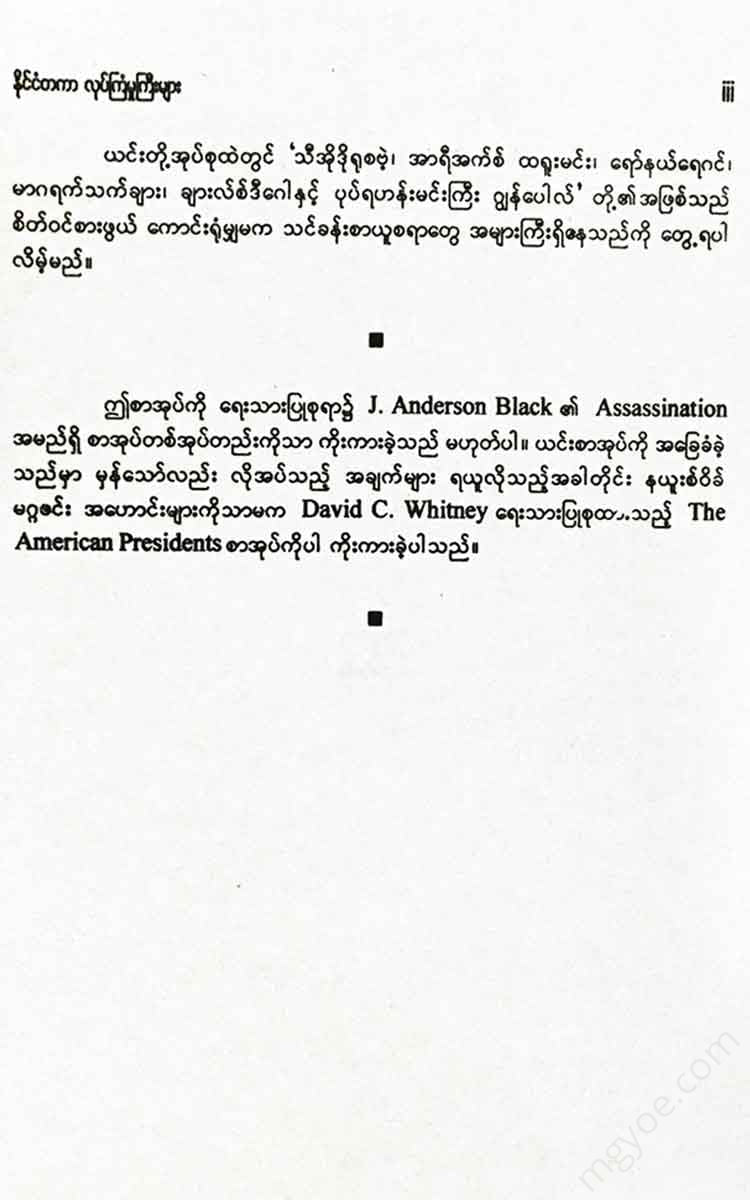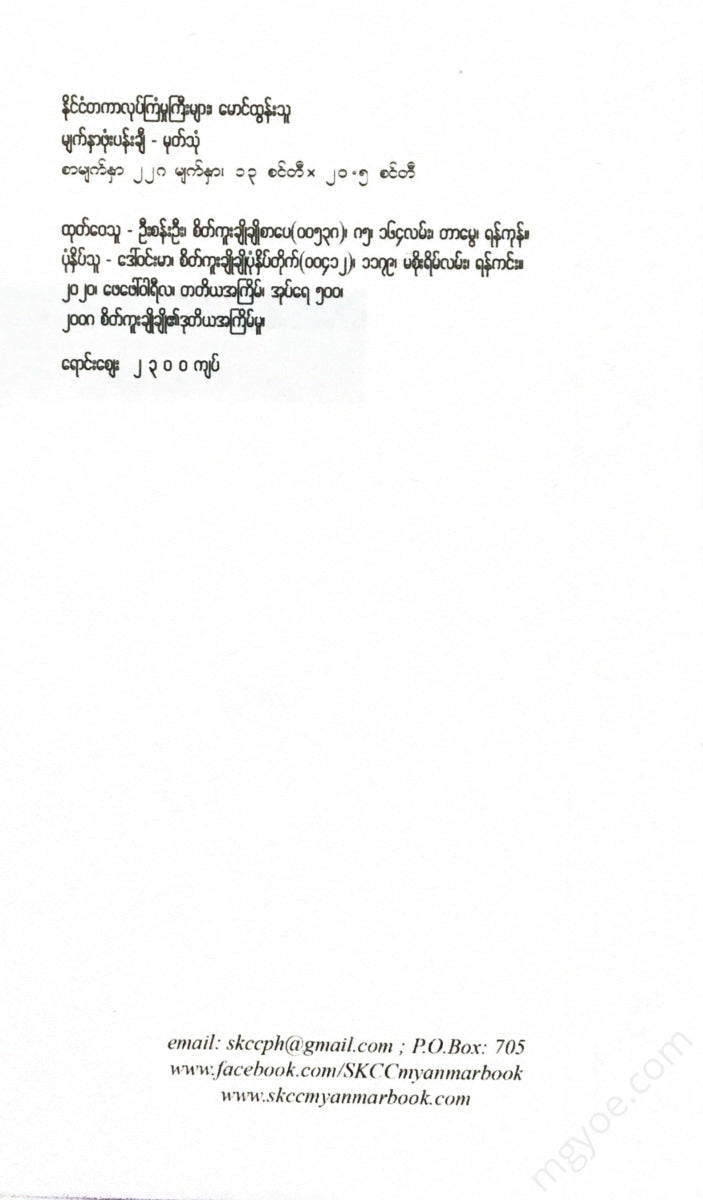စိတ်ကူးချိုချိုစာပေ
မောင်ထွန်းသူ - နိုင်ငံတကာ လုပ်ကြံမှုကြီးများ
မောင်ထွန်းသူ - နိုင်ငံတကာ လုပ်ကြံမှုကြီးများ
Couldn't load pickup availability
ASSASSINATION What is it?
The English word ASSASSINATION means “assassination” or “murder” in Burmese. Assassination comes from the word Assassinate, which means “to assassinate” or “to ambush and kill.”
There is another word that is derived from these words. It is the word ASSASSIN, which means “assassin” or “assassin.” Depending on the circumstances, it is also used as “ambush.”
Some scholars claim that the word ASSASSIN comes from the Arabic word Hashashin. More specifically, it means 'Hashish Eaters'. Hashish (Hasheesh) is an Arabic word meaning cocaine or marijuana.
The term was used to refer to the Shiite Muslims of the eleventh century. These Muslims were the followers of Hasan al-Sabah, who was known as the "Old Man of the Mountains."
At that time, the Hasids lived in the "Alamat Fortress" in Persia. This group was known as a fierce and ruthless warrior, and they were a people who stirred up unrest throughout the Middle East. They systematically used the method of exterminating their opponents to gain power and control.
The Crusades of the twelfth and thirteenth centuries were fought by Christian warriors called the Crusaders. The Crusaders were Christians from England and other European countries. They did not speak the Arabic word "Hassan" fluently. The French, however, changed the pronunciation of the word to "Assassin" and it became "Assassin".
Then, the word was used in Northern European countries, and the Chambers English Dictionary even defined its meaning. According to the dictionary, “Assassin is a person who commits a sudden attack or secret assassination for political reasons.”
In fact, assassinations were already in existence before the eleventh century and long before the emergence of the Hashemite Muslim sect. The killing of political figures for personal gain is mentioned in the Christian “Old Testament,” so it is likely that this act or method emerged and was practiced as early as prehistoric times.
Early attempts
The most significant and famous "first assassination" in world history was the assassination of "Julius Caesar" in 44 BC. At that time, Julius Caesar was stabbed to death in the Senate by his political rivals or opponents.
The assassination of Julius Caesar became a tradition. After this assassination, Roman history was filled with political assassinations. The second most famous of these was the insane and extremely corrupt Gaius Caesar. He was known to history as "Caerullus". He was assassinated by his own bodyguard, the Praetorian Guard, in 41 AD. His successor, Claudius, and his wife, Agrippina, poisoned him in 54 AD. This assassination was also politically motivated.
After the assassination of Claudius, “in the Roman Empire, where the imperial system flourished, assassination became a common practice. This was unfortunate for both the state and its citizens. For those who were concerned only with their own interests or those of their own group, assassination became a political tool.
In any case, this method of assassination became a powerful political weapon for selfish, egotistical, and self-serving individuals to threaten and harm the people. Thus, in the four hundred years after the death of "Claudius," many of the most prominent politicians in the Roman Empire and twenty subsequent emperors were assassinated.
Many emperors of the "Eastern Roman Empire" were assassinated in Constantinople. In 378 AD, the Roman Emperor Belen was killed by the "Goths," a group of Germanic tribes who invaded the Roman Empire. The Goths were a barbarian people who conquered the Roman Empire in the 3rd, 4th, and 5th centuries AD.
After the assassination of "Belin", "Flavius Tiberius Mauricius" was assassinated in 602 AD. Then, in 641 AD, "Constantine III" was assassinated, in 668 AD, "Constantine II" was assassinated, in 711 AD, "Justinian II" was assassinated, in 721 AD, "Anastasius II" was assassinated , and in 797 AD, "Constantine VI" was assassinated.
The last of this group to be assassinated was Constantine IV, who was assassinated on the orders of his own mother. Then came Romanus IV in 1072 and Alexius II in 1183.
The Roman Emperor who ascended the throne as "Alexander IV" was assassinated by his successor, "Alexander V". This "Alexander V" was also assassinated by the fiercely motivated Crusaders who captured Constantinople in 1204, throwing him from a large stone pillar in the city.
Infection
Historical records show that many of the early popes were assassinated. In 882 AD, Pope John VIII was stabbed to death by an assassin.
In 897 AD, Pope Stephen XV was strangled to death by an assassin. Similarly, in 974 AD, Pope Benedict XIII was strangled to death by an assassin.
Political assassinations also spread to the Mediterranean countries. King Haakon the Great of Norway was assassinated by his own bodyguard in 995. His successor, Stein II, was assassinated in 1157, and King Haakon II in 1162.
In Scotland, where kings were often given priority over their lineage, "King Duncan I" was assassinated in 1040 by "King Macbeth" and in 1057 by "King Malcolm I the Third". A particularly notable incident was the assassination of King Canute IV of Denmark by a mob in 1086.
The most brutal assassination attempt
In 1100, King William the Conqueror of England was assassinated while on a hunting trip. Seventy years later, on Christmas Day 1170, Thomas Becket, Archbishop of Canterbury, was assassinated in his church by the soldiers of King Henry II.
In 1327, the deposed King Edward II was brutally murdered by soldiers with burning matchlocks. Historians have recorded it as one of the most brutal and brutal assassinations in world history. In 1483, on the orders of King Richard III, Edward IV and his younger brother were assassinated, aged just fourteen.
Joan of Arc, the heroine of France , was also, upon closer examination, found to have been systematically burned and murdered. Four hundred years after Joan of Arc was murdered, Denis Afrique, Archbishop of Paris, was assassinated during the 1848 Revolution. His successor, Archbishop Marie-Dove Auguste-Siberie, was stabbed to death by a mad monk in 1857.
If we were to list the number of people who have been assassinated in world history, there would be a large number. The practice of killing for political reasons has been around for about two thousand years. People claim that their culture has developed, but they still use assassination as a mean tactic if they have political differences or are superior to them in some way.
Therefore, the method of assassination, which was used so brutally two thousand years ago, has survived to this day. In fact, this method is a disgusting and evil method. It is a method that expresses a depraved and degraded mentality. It is a method that hinders or destroys the progress and development of human history.
In today's increasingly intelligent societies, the number of people who detest this method is increasing day by day. However, it is hard to believe that this idea has become firmly established. Because...
Denis Affre, Archbishop of Paris
